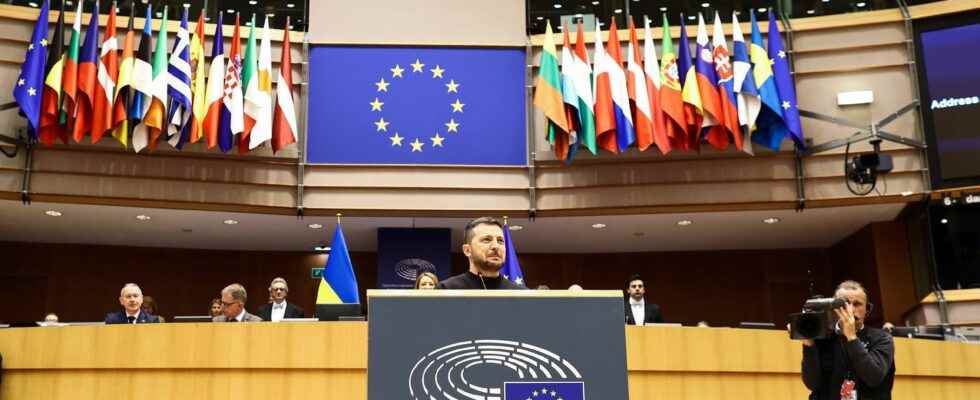It is 12:15 p.m. in Brussels this European summit Thursday. The Ukrainian president sits with the other heads of state and government in the multicolored room of the Europa building, the heart of power of the European Union; the work session can begin. Science fiction? Not even: for a few hours, on February 9, Volodymyr Zelensky was welcomed in the EU capital almost as a full member of the bloc. “Welcome to the house !” greeted Charles Michel, the President of the European Council, who had come to welcome him at the airport. “It is a strong signal that President Zelensky is personally attending our first meeting of the year. Ukraine is part of the European family,” added German Chancellor Olaf Scholz.
While it was more than uncertain before February 24, 2022, because the EU no longer intended to expand, Ukraine’s European future seems ineluctably drawn. However, can this country at war become a member as early as 2026 as it hopes, or will it on the contrary have to wait “several decades” as Emmanuel Macron predicted? Kyiv achieved coveted candidate country status in June, a speed record.
The Ukrainian power is now aiming for a formal opening of accession negotiations at the end of 2023. This will require the unanimity of the Twenty-Seven. “It does not eat bread to give them the status of candidate, nor to say that they are destined to enter. We are in the symbolism, decrypts Olivier Costa, director of research at the CNRS. But, to become a member, it is necessary be in a position to apply all European law on the day of entry.” Tens of thousands of standards to integrate, administrative and organizational reforms… the enlargement procedure provided for by the treaties is demanding, and the journey is necessarily long.
Avoid “losing” the Ukrainians
The Twenty-Seven are faced with a dilemma. “If we make the Ukrainians wait twenty-five years, we are going to lose them. But if we bring them in too quickly, we are going to get lost”, summarizes an official from a member country, who points to the discrepancies in respect for the rule of law and or the level of the economy. Not all capitals are ready for an upheaval in internal balances within the EU. The risk of a tilting of the center of gravity towards the East worries in France and elsewhere in the West. “In Portugal, there is a tension between solidarity vis-à-vis Ukraine and national interests, analyzes Livia Franco, professor at the Catholic University of Portugal. Lisbon cannot help thinking that membership of Ukraine would increase the peripherality of the country. A price that the Portuguese are not ready to pay in the near future.” “We would not want the acceleration of the calendar to be done to the detriment of the integrity of the European project”, abounds an Elysian source.
It is therefore difficult to imagine that Ukraine will make its entrance without being completely ready. “The EU works like a co-ownership based on trust and reciprocity. If Ukraine sees itself exempted from whole sections of European law, the system will jump in six months! One country will no longer want to apply anti-pollution standards, another will reuse pesticides”, predicts researcher Olivier Costa. And if Ukraine gradually integrates policies, each time it closes one of the six strands of negotiations, Hungary or Poland, for example, will have a fair chance of saying that they too want the internal market, but not the rest.
To avoid “losing” the Ukrainians, the European Commission is therefore relying instead on a pragmatic rapprochement via a telephone roaming agreement or exemption from customs duties for exports. The European Political Community, imagined by Emmanuel Macron as a form of “waiting room”, can also play a role. The format remains very informal – it brought together all the leaders of the continent in October in Prague -, but it still does not have a secretariat. A next summit will be held in June in Moldova. “We must ensure that in this context we are able to develop cooperation of common interest which makes it possible to anchor Ukraine,” said a European diplomat. If the objective of membership is clear, the path remains to be invented.
